The primary aim of the IFRoS program is to cultivate a diverse knowledge base in robotics, drawing from various backgrounds. This objective is accomplished through the combined expertise of our core faculty spanning three host universities in Hungary, Croatia, and Spain, as well as through the inclusion of visiting scholars from diverse companies and institutions. These scholars greatly enhance the program's richness and diversity by sharing insights across a spectrum of subjects, including technical know-how, entrepreneurship, and knowledge transfer.
Scholars share their real-world experience with students through engaging seminars and workshops ranging from 1 day to 3 months.
Are you a leader in the field of robotics with a passion for sharing your knowledge? We invite you to consider becoming a visiting scholar for upcoming semesters. For more information and to discuss potential collaborations, please contact us at info@ifrosmaster.org.

Dr. Miguel Castillón is the Autonomous Navigation Lead at Keybotic, a startup specializing in the development of quadruped robots for industrial inspections. He earned his Ph.D. in Autonomous Robotics from the University of Girona in 2023, focusing on 3D perception and navigation for autonomous underwater robots. His doctoral work included the development of an underwater 3D laser scanner and a non-rigid point cloud registration method to correct motion distortion in dynamic scans. Dr. Castillón also holds an M.Sc. in Robotics from KU Leuven and a B.Sc. in Industrial Engineering from the University of Zaragoza. His research interests encompass SLAM, optimization, and sensor perception for autonomous navigation in challenging environments.
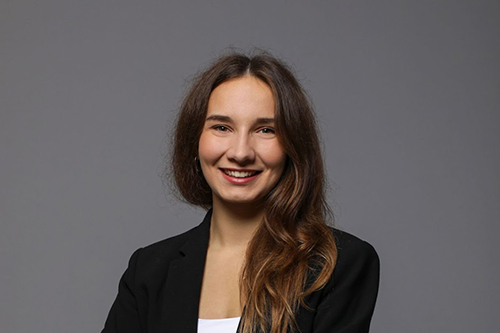
Antonella Barišić Kulaš, M. Sc. is a researcher, Ph.D. student and project manager at the University of Zagreb Faculty of Electrical Engineering and Computing (UNIZG-FER). She obtained her Master’s degree in Electrical Engineering and Information Technology from UNIZG-FER in July 2019. She spent one year working as research lead on NATO Science for Peace and Security project at University of New Mexico (UNM), New Mexico, USA, in Prof. Rafael Fierro's lab. During her studies, she held various positions, such as team leader and project manager, in the student association eSTUDENT, where she supervised various projects and coordinated collaborations with industry and academic partners. Additionally, Antonella organized DroneDays, an aerial robotics end-user workshop, for three consecutive years, contributing significantly to the field’s community engagement and knowledge exchange.
In 2018, she became one of the first recipients of the Laboratory for Robotics and Intelligent Control Systems (LARICS) scholarship. In 2019, she was awarded with the Rector’s Award for Individual Scientific Work. Her research interests lie at the intersection of robotics, computer vision, and deep learning. She is passionate about developing intelligent robotic systems that can understand their environment. As part of the LARICS team, she was responsible for Challenge 1 of the MBZIRC 2020 international robotics competition. Her contributions extend to the EU-funded projects EKOKOMVOZ and VirtualUAVs. Presently, she is engaged in the AeroSTREAM Horizon project and is preparing for the MBZIRC 2024 competition.
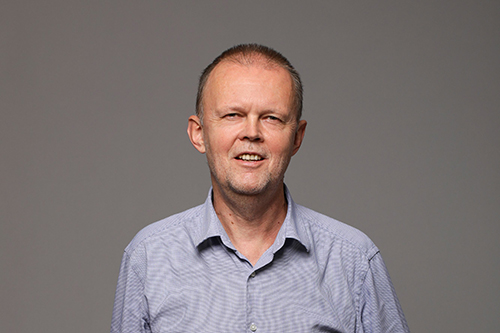
Stjepan Bogdan, PhDEE, is Full Professor at the Laboratory for Robotics and Intelligent Control Systems (LARICS – https://larics.fer.hr/larics), Department on Control and Computer Engineering, Faculty of Electrical Engineering and Computing, University of Zagreb (UNIZG-FER), where he teaches several courses in robotics and automation. From October 1st, 2022, he is appointed Vice-Dean for Research and Innovation at UNIZG-FER. His research interests include autonomous systems, aerial robotics, multi-agent systems, intelligent control systems, bio-inspired systems, and discrete event systems. He is a co-author of 4 books and has published more than 200 scientific papers. He was the Principal Investigator and a researcher on more than 30 national and international research projects. He served as an Associate Editor of several scientific journals and was a PC member and AE of major control and robotics conferences.
He is IEEE senior member, and appointed member of IEEE Tech. Comm. on Intelligent Control and IEEE Tech. Comm. on Aerial Robotics. He was representative of Croatia at European Union Control Association (EUCA) and in H2020 Program committee on Space. He was Program Committee member of Horizon Europe Cluster 4 – Digital, Industry and Space. He spent 1996/1997 as a Fulbright scholar at Automation and Robotics Research Institute, The University of Texas at Arlington, under supervision of Prof. Frank Lewis.

Joseta Roca holds a Bachelor's degree in Business Administration from the Universitat de Girona, which she obtained in 2007, followed by a Master of Science in Business Innovation and Technology Management from the same university in 2009.Her research interests primarily revolve around the management of technology transfer and its impact on research groups. Specifically, she focuses on organizational challenges faced by public entities in technology transfer, technology marketing, and the legal aspects of technology valorization.
Joseta has garnered diverse professional experiences across various domains. She began her career in the coordination of the UdGMBA program at the University of Girona Foundation, where she was responsible for planning and scheduling lessons in subjects such as Entrepreneurship, Production Management, and Marketing. Later, she transitioned to VICOROB, where she played a pivotal role in project management and business development. During her tenure, she contributed significantly to restructuring the research team, resulting in increased public funding and enhanced collaboration with private entities for technology transfer. Her efforts culminated in the establishment of IQUA Robotics in 2016, a successful venture in the field of underwater robotics, and the licensing of SOUNDTILES in 2019.
Currently, Joseta serves as an Executive Assistant at IQUA Robotics, where she oversees a wide array of responsibilities ranging from general management to project management, business development, marketing, and HR. Her dedication to fostering innovation and driving impactful technological advancements underscores her commitment to realizing entrepreneurial visions and pushing boundaries in the field.
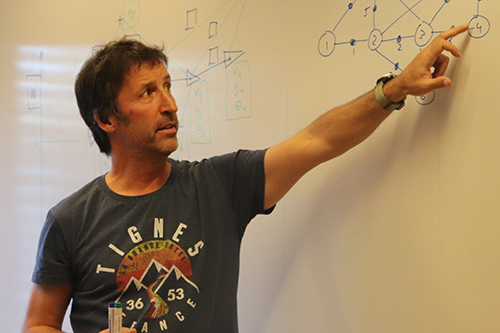
Joan Solà received his MsC in Telecommunications for the Universitat Politècnica de Catalunya in 1995, and his PhD in automatic control and robotics for the University of Toulouse in 2007, which was hosted by the Laboratoire d'Analyse et Architecture de Systèmes (LAAS-CNRS, Toulouse). In 2008 he obtained the 2nd position in the Best Thesis on Robotics award by the GDR-Robotique in France. In 2013 he obtained a Ramon y Cajal position and moved to the Institut de Robòtica i Informàtica Industrial in Barcelona (IRI). Since 2020, Joan is a Tenure Scientist of the Consejo Superior de Investigaciones Científicas (CSIC).
Joan has devoted a significant amount of his research to the problems of robot perception, sensor fusion and simultaneous localization and mapping (SLAM), to which he contributed pioneering results related to landmark initialization in monocular SLAM. He has recently shifted interests towards estimation and control of agile motion by legged and aerial robots, and leads a line of research on this topic at IRI. Joan is active in the dissemination of knowledge and has held several courses on SLAM and Lie theory, the latter accumulating more than 40k views on several Youtube videos.
Joan has also participated to innovation from the industry. He was developing innovative power electronics for renewable energies from 1995 to 1999 at Ecotècnia s.c.c.l., now part of General Electric. He has also participated in the creation of a manned submarine for deep-ocean exploration, the Ictineu-3, able to take three people to 1200m depths.
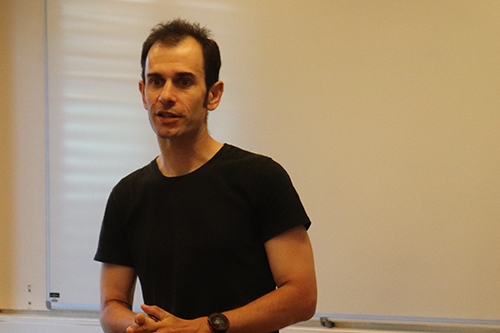
Dr. Josep Quintana received his PhD degree from the University of Girona in 2012 for his research on Computer vision techniques for early detection of skin cancer. He also holds a B.Sc. degree in Computer Science (2006) and a M.Sc. degree in Industrial Computing (2008) from the same university. His research activity is mainly focused on detecting skin cancer lesions on full body skin images, also he participates on other topics such as underwater robotics doing large-scale seafloor mapping, 3D reconstruction, semantic representation of video imagery and robot navigation.
He is currently the head of the R&D department at Coronis Computing. Additionally, he is a lecturer at the University of Girona teaching subjects related to computer vision and machine learning. Dr. Quintana has published extensively in peer-review journals and in international scientific conferences.

Kristian Hengster-Movrić is a docent (~an associate professor) of technical cybernetics and his focus is on mathematical theory of distributed control, consensus problem and optimal control.
Kristian received his Ph.D. degree from University of Texas Arlington, USA, in 2013, having been supervised by Prof. Frank Lewis. For his thesis he was awarded N.M. Stelmakh Prize. At Czech technical University in Prague (CTU) he is currently giving lectures within a graduate course on dynamics and control of networks and a doctoral course on distributed control. He supervises a few doctoral and master students. He also serves as an administrator of the CTU participation in the double-degree Spacemaster (Erasmus Mundus) program.
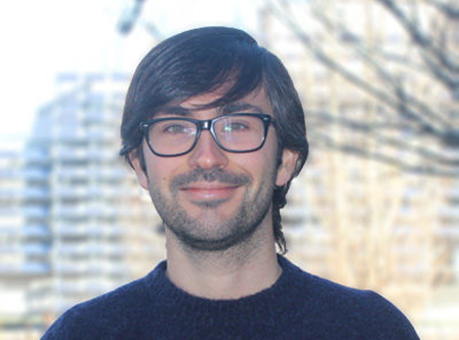
Dr. Marc Masias received his PhD degree from the University of Girona in 2014 for his research on automatic object detection in astronomical images. He also holds a B.Sc. degree in Computer Science (2010) and a M.Sc. degree in Industrial Computing (2011) from the same university. His research interests include object segmentation, detection and classification in different fields.
He is currently working (and partnering) at Opsis Vision Technologies as a computer vision software engineer. Additionally, he is a lecturer at the University of Girona teaching subjects related to computer vision and machine learning.
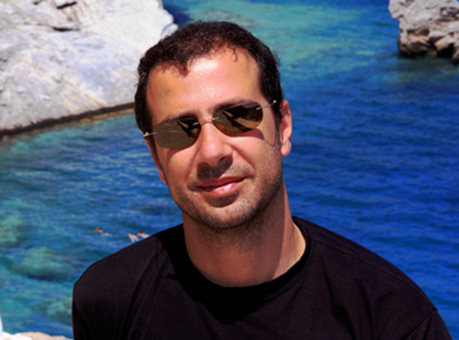
Dr. Angelos Mallios received his PhD degree (2014) on computer vision and robotics at Universitat de Girona, in the field of underwater sonar based localization and mapping, and has received numerous awards including 3 Marie Skłodowska-Curie Actions. He specializes in the design of underwater vehicles and sensory technology with a focus on autonomy, accessibility and efficiency. He has been in marine research for over two decades and held researcher appointments in high profile institutes such as the Hellenic Centre of Marine Research in Greece, Universitat de Girona in Spain, and Woods Hole Oceanographic Institution in the US. He has participated in a number of research and innovation projects and cruises all over the world, including H2020, NSF, NASA, and NOPP.
He currently serves as Technical Director and co-founder of PLOATECH, based in Girona Spain, a marine technology consulting company that provides advanced scientific and customized engineering services covering remote sensing, instrumentation R&D, robotics and data processing.

Dr. Gerard Canal is a Royal Academy of Engineering (RAEng) UK IC Postdoctoral Research Fellow at the Department of Informatics, King's College London. His research interest are in the application of AI planning and reasoning techniques to the field of assistive and service robotics.
In March 2020, he completed his PhD in Robotics at the Institut de Robòtica i Informàtica Industrial under the supervision of Dr Guillem Alenyà and Professor Carme Torras. In 2013, he received his bachelor's degree in Computer Science from the Facultat d’Informàtica de Barcelona, part of the Universitat Politècnica de Catalunya. Later, in 2015, he obtained a master's degree in Artificial Intelligence from Universitat Politècnica de Catalunya, Universitat de Barcelona and Universitat Rovira i Virgili.
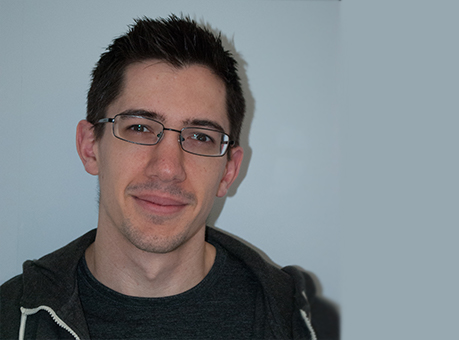
Dr. Michael Cashmore is Chancellor's Fellow at the University of Strathclyde (Computer and Information Sciences). He is a member of the Human-Centric AI group and leader of the Strathclyde Doctoral School in Explainable AI for Industrial Decision Support.
His research focuses on the challenges of integrating AI Planning and Scheduling in robotics and human-AI teaming. Through a series of projects he has developed the ROSPlan framework for embedding AI Planning tools in ROS.
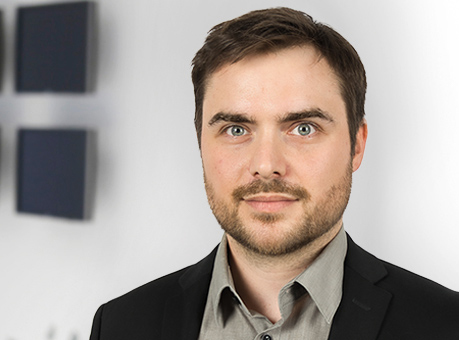
Sebastian Lapuschkin received the Ph.D. degree with distinction from the Berlin Institute of Technology in 2018 for his pioneering contributions to the field of eXplainable Artificial Intelligence and interpretable machine learning. From 2007 to 2013 he studied computer science (B. Sc. and M. Sc.) at the Berlin Institute of Technology, with a focus on software engineering and machine learning. Currently, he is a tenured researcher and head of the Explainable AI Group at Fraunhofer Heinrich Hertz Institute (HHI) in Berlin.
He is recipient of multiple awards, including the Hugo-Geiger-Prize for outstanding doctoral achievement and the 2020 Pattern Recognition Best Paper Award. His research is focused on computer vision, (efficient) machine learning and data analysis, data and algorithm visualization, and the interpretation, analysis and rectification of machine learning system behavior.

Dr Enrique Fernández received the PhD degree with distinction from the University of Las Palmas de Gran Canaria in 2013 for his contributions to Ocean Gliders Path Planning. He previously received the BSc degree in Computer Engineering and MSc degree in Intelligent Systems and Numeric Applications in Engineering from the University of Las Palmas de Gran Canaria in 2008 and 2009. Enrique joined PAL Robotics in 2013 and was part of the Navigation Department. In 2015 he moved to Canada to join Clearpath.
He is currently working at OTTO Motors division developing perception systems for self-driving industrial vehicles. His research interests include Simultaneous Localization And Mapping and Computer Vision.
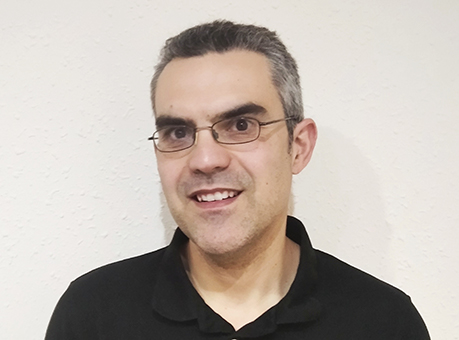
Dr Carles Matabosch, obtained his PhD in Industrial Engineering at the University of Girona. He previously worked as Technical Director at AQSENSE and he is now Manager Software Engineering at the multinational Cognex, in Girona.
In both cases, he developed industrial vision products and projects, especially in the field of three-dimensional Machine Vision. He is author of a patent related to 3D Machine Vision processing procedures and several research articles and conferences.
He is also a member of the Sectorial Advisory Council of the Robotics Campus of the UdG.
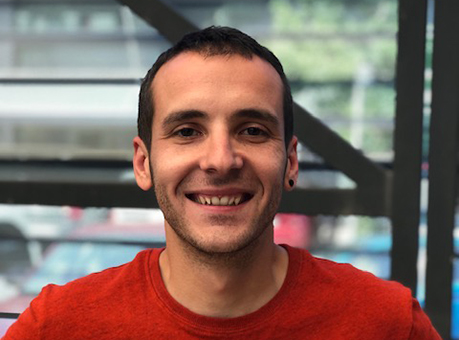
Dr. Josep Bosch received the Ph.D. degree with distinction from the University of Girona in 2018 for his research focused on omnidirectional vision applied to underwater robotics. Previously he received the B.Sc. degree in industrial engineering and a M.Sc. degree in information technologies from the University of Girona in 2012 and 2014. He has authored several peer-reviewed articles and participated in many national and international research projects and conferences.
He is currently working on IQUA Robotics developing mapping software for imaging sonars. His research interests include underwater robotics and optical and acoustic mapping.
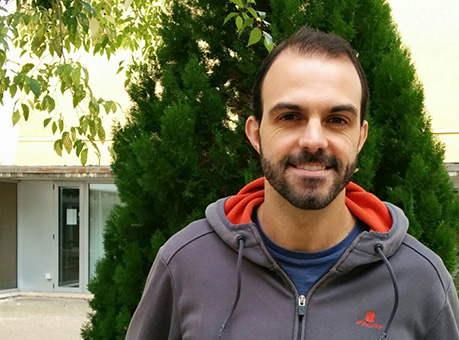
Dr Oliver Díaz is Associate Professor at the University of Barcelona (Faculty of Mathematics and Computer Science) and senior member at the Barcelona Artificial Intelligence in Medicine Laboratory. He holds a PhD in Electronic Engineering from the University of Surrey, UK (2013) and was a Marie Skłodowska-Curie Postdoctoral Fellow (2015-2017). Dr Díaz has 10+ years international research experience in the field of biomedical data analysis and has participated in 20 research projects (H2020, FP7, EIT Health, ...).
His current research is focused in the development of trustworthy artificial intelligence (AI) algorithms to support clinical decisions in the healthcare sector.
Ing. Matouš Vrba received his Master's degree from the Faculty of Electrical Engineering at the Czech Technical University in Prague and is now pursuing a PhD in robotics in Martin Saska's Multi-Robot Systems group. His main research interest is autonomous micro aerial vehicles with a focus on machine learning, computer vision and robotic perception for drone detection and localization.
As part of his studies, he participated in the prestigious MBZIRC 2020 robotics competition as part of the winning team CTU-UPENN-NYU and in the DARPA SubT competition as part of the CTU-CRAS-NORLAB team. He also co-developed the MRS UAV system for self-localization, planning and control of autonomous aerial vehicles. Matouš Vrba has authored 6 journal publications (3 as lead author) and 5 conference publications (1 as lead author).
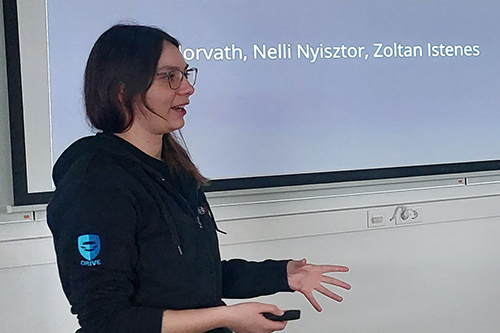
Nelli Nyisztor is a Ph.D student at Eötvös Loránd University, Budapest and a researcher at Bosch Hungary – specializing in visual sensors and sensor fusion. She works on an aerial image-based pose estimation method assisting ADAS development. Her interests lie in computer vision, machine learning and 3D reconstruction.
She earned her M.Sc. in autonomous systems via a double degree program split between Politech Nice, France and Eötvös Loránd University, Hungary. Her master thesis covers 6-DoF pose estimation using Neural Radiance Fields.

Simone Gasparini is an Assistant Professor at Institut National Politechnique de Toulouse since 2013.
He received the Laurea degree in computer engineering from Politecnico di Milano in 2003 with a thesis in the field of Robot Mapping.
He then received a Ph.D. in Information Technology at Politecnico di Milano in 2007 with a thesis on 3D reconstruction from single images with omnidirectional cameras. His main interest and contributions in 3D reconstruction from images, real-time structure from motion and computer vision for mobile devices have been published in major international conferences and journals. He is one of the contributors and maintainers of the Alicevision open-source software ecosystem for photogrammetry.
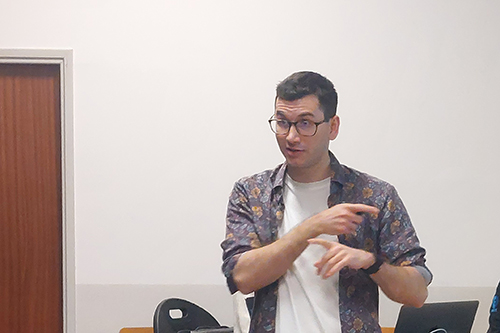
Dániel Horváth is a research associate, pursuing his Ph.D. at the Eötvös Loránd University, Budapest, Hungary in collaboration with the Institute for Computer Science and Control, Budapest Hungary, and, as a Campus France scholar, with the École Nationale Supérieure des Mines de Paris in France. His research focuses on robotics in the fields of reinforcement, curriculum, and transfer learning, and computer vision.
He received the M.Sc. degree with the highest honours in mechatronics from the Budapest University of Technology and Economics, Budapest, Hungary, in 2019, spending one semester each at the Technical University of Denmark, Copenhagen, Denmark, and the Otto von Guericke University, Magdeburg, Germany.

Tomislav Petković is Associate Professor at the University of Zagreb Faculty of Electrical Engineering and Computing. He received the engineer’s degree, the magister degree, and PhD in electrical engineering all from the University of Zagreb, in 2002, 2006, and 2010, respectively. His main fields of research interest are digital image processing and analysis, 3D imaging, and computational imaging. He is currently leading a research project "Robust Structured Light Coding for 3D Imaging in Difficult Conditions" where new structured light patterns and underwater structured light image are investigated. He teaches several graduate courses in the field of digital signal and image processing. He is a member of IEEE and ACM.
